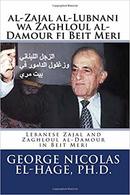al-Zajal al-Lubnani wa Zaghloul al-Damour fi Beit Meri:
(Lebanese Zajal and Zaghloul al-Damour in Beit Meri)
Zajal is the public register of the collective memory of its people and the chronicle that preserves their traditions, conventions, and popular heritage. It is mainly an oral poetic tradition that is meant to be presented (sung or recited) in a public forum before an audience, preferably on stage, between two poets or more. The origins of Zajal date back to pre-Islamic Arabia; some also argue that Zajal originated in Andalusia during the Arab’s occupation of Spain. The first wave of Zajal that reached us dates back to the 12th century where this form of poetry in dialect became popular in Lebanon and later flourished in monasteries and among educated scholars, linguists, and even prominent politicians including the ruler of Lebanon, Emir Bashir, The Second. The second wave of Zajal started in the late 1930s with the poet Asaad el-Khoury al-Fighali, better known as Shahrour al-Wadi, who established the first group of poets and set the early rules of Zajal on stage. He was followed by a number of (Zajjaaline): Zajal poets, who carried on the tradition. However, one name stands out as the founder of modern Zajal poetry in Lebanon: Joseph al-Hashime, better known as Zaghloul al-Damour (1925- 2018). Zaghloul actively accompanied this art for over seventy years. He is considered the patron-poet of Zajal and its representative par excellence. It is agreed among critics that he is the teacher, educator, and the one-man- academy that graduated tens of modern poets who studied under his supervision, learned from him, emulated him, and owe their reputation and career to his tutelage and sponsorship. Poets who wanted to be recognized and accredited either joined his group or sought to challenge him on stage just to say that they sang along with Zaghloul. Zaghloul founded the modern school/academy of Zajal poetry, established the definitive rules of debate/challenge between poets, set up the protocol of “an evening of Zajal poetry” on stage, was the first to appear with his group on television in a weekly Zajal show, and is hailed as the ambassador of Lebanese Zajal to the world of Diaspora to bring a taste of home to Lebanese and Arab immigrants around the globe. He became the preferred voice of poetry chosen to celebrate Lebanon’s weddings, funerals, national commemorations, and social events. He also established the first journal to publish Zajal poetry, debates, and duals between poets on regular basis. His journal,al-Masrah, continued its mission for over twenty years. He also published a number of his own poetry books. All said, Zaghloul remains a unique poet in the history of Zajal. His name has become synonymous with this art beloved to all Lebanese and Arab people. Zaghloul was endowed with three gifts that distinguished him and put him in a class by himself: 1) a unique talent for romantic poetry, especially spontaneous poetry inspired by the occasion or situation at hand, that touches the hearts and the minds of the listeners, 2) an exceptional and matchless voice that is in itself an orchestra of hummingbirds and multiple musical instruments simultaneously playing, 3) but above all, he was gifted with a gentle and temperate character and a kind and loving personality that endeared him to his contemporaries, his audiences, and his challengers and rivals alike. Zaghloul will be remembered not only for his poetic genius and his pioneering role but also for his humility, humanity, and for having been supportive and loyal to his friends and always gracious, civil, and forgiving towards his opponents on stage. Those who challenged him were always taught a lesson but without being degraded or embarrassed by him on stage. His passing at the age of 93 dealt a great blow to the most cherished art of Zajal, and he was mourned across Lebanon, the entire Arab world, and in Diaspora.

